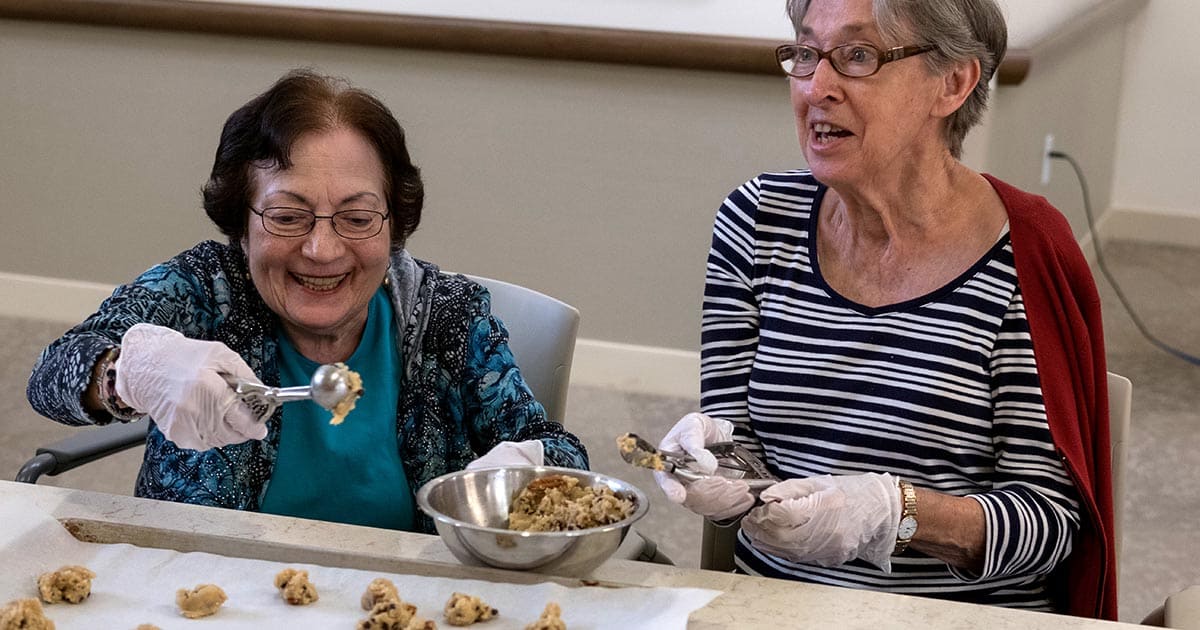As we age, our social lives can change significantly. Our children grow up and move away, careers come to an end, and we may lose friends and spouses along the way. Often, these smaller social circles leave seniors at risk of isolation and loneliness, which can have serious implications for health and well-being.
This is why socialization for seniors is essential. Senior living communities have come a long way in understanding and providing opportunities for residents to engage, connect, and enjoy the company of others. This blog, curated by Abe’s Garden Community, discusses why socialization is important and how senior living can help.
The importance of socialization for seniors
According to research shared by the AARP, friendships are beneficial for the health and well-being of older adults. Here’s a closer look at the details:
Health benefits
Medical News Today reported that multiple studies have consistently demonstrated the positive impact of social interaction on the mental and physical health of seniors. Socialization can reduce the risk of cardiovascular problems, some cancers, osteoporosis, rheumatoid arthritis, and even Alzheimer’s disease. Plus, social engagement can lead to increased cognitive function, helping to keep the brain active and potentially slowing the progression of memory decline.
Emotional well-being
Regular social interaction, according to studies published in the National Library of Medicine, can help alleviate depression, anxiety, and stress — common mental health conditions for seniors living alone. Interacting with others reinforces feelings of usefulness and belonging, enhancing self-esteem and overall happiness.
Motivation for self-care
Engaged seniors are often more motivated to take care of themselves because they want to be active and social. They are more likely to eat well, exercise, and stay on top of medical care, knowing that they have events to attend and friends to see.
How senior living can help with socialization
Structured social programs
Senior living communities are designed to keep residents engaged. They offer an array of events, from group exercise classes and art workshops to book clubs and movie nights. There’s something for everyone, ensuring that residents have the opportunity to be as active and social as they choose to be.
How to keep busy in a senior living community >>
Common spaces for unstructured interaction
Aside from organized activities, senior living provides common areas such as lounges, libraries, gardens, and cafes where residents can meet and form friendships. This can lead to spontaneous socialization, chats over coffee, or just shared time reading side by side.
Community spirit
Living in a community where everyone is at a similar stage in life can be incredibly comforting. Shared experiences foster a sense of camaraderie that can be difficult to find elsewhere. Moreover, living near your peers means it’s easy to establish a routine of checking in on each other, further strengthening community bonds.
Discover the amenities senior living can offer >>
Assistance when needed
For many seniors, physical limitations can be a barrier to socialization. Senior living communities provide the necessary support, whether that’s transportation to outings, mobility assistance, or helping residents get to and from social events on campus. This ensures everyone has access to social opportunities, regardless of physical ability.
Safety and security
Knowing that they are in a safe environment, with accessible spaces and staff on hand at all times, can give residents the confidence to socialize more freely. They can worry less about potential emergencies and focus more on enjoying their interactions.
What to expect in senior living >>
Catering to diversity
Communities today honor their residents’ diverse interests and backgrounds. Cultural celebrations, religious services, and hobby-specific clubs ensure that every resident can feel included, respected, and seen, which is critical for meaningful socialization.
Senior living promotes an active and social lifestyle
In a world that often prioritizes youth, senior living communities are a testament to the importance and value of the later chapters in life. These communities are not just places to live; they are places to thrive.
Through thoughtful design and an understanding of the critical role that socialization plays in an older adult’s well-being, senior living offers an inviting and vibrant setting to connect, engage, and live purposefully.
Are you ready to explore senior living?
Download our free guide, “The Complete Guide to Choosing Between Senior Living Options,” to help you understand the options available to you or your loved one. You’ll learn the differences between the levels of care, what costs to expect, how to create a budget, and what questions to ask when visiting communities.

